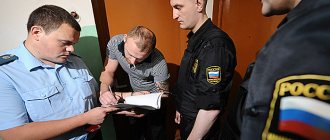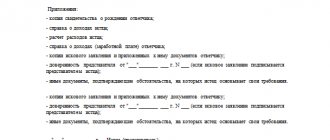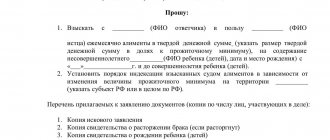List of legal costs
Costs include:
- representative services;
- cost of examination;
- postal items;
- fare;
- costs for issuing a notarized power of attorney.
The list of costs is open. Most often, judges consider applications for the recovery of legal costs for a representative, and therefore the main amount of money is paid by applicants for highly qualified legal assistance.
It is not always possible to receive a full refund. When considering such issues, the judge proceeds from reasonable limits within which funds are subject to compensation.
The Supreme Court of the Russian Federation noted that when resolving the issue of reimbursement of costs, it is legally significant to establish a connection between the amount of costs incurred and their justification, necessity and reasonableness, based on the prices that are usually set for such services.
Reasonable costs in established practice mean the costs that would be charged for similar services under similar circumstances. When determining reasonableness, the volume of the stated requirements, the price of the claim, the complexity of the case, the volume of services provided by the representative, the time required for the preparation of procedural documents, the duration of the consideration of the case and other circumstances are taken into account.
When resolving the issue of the amount of money collected for reimbursement of costs, the court does not have the right to reduce them arbitrarily, unless the other party raises objections and provides evidence of the excessiveness of the amount of costs collected.
Are you going to court? Study court decisions on similar cases. The database of judicial practice in ConsultantPlus will help you find them (get free access to it by clicking on the link below). The database contains decisions of all Russian courts, and the search is as simple as in Yandex.
Is it possible to confirm payment for services from a legal entity with a receipt?
Can.
This was the answer given by the Moscow District Court in case No. A40-226879/2017, where individual entrepreneur Tatyana Chetverkina recovered 73,000 rubles from her losing opponent. expenses for lawyer I. Chistyakov. He confirmed receipt of the money with a receipt. But two authorities considered this to be inadmissible evidence. After all, a receipt is not a payment document for an individual entrepreneur as a legal entity. Here the courts referred to the accounting law and a number of provisions of the Central Bank.
The receipt could support the expenses, the district court objected. Restrictions on cash payments exist for tax and corporate purposes, but not for private law purposes. According to the meaning of Art. 408 of the Civil Code, fulfillment of obligations can be confirmed by a receipt that the creditor issues to the debtor. Even if the primary accounting documents are not drawn up, this in itself does not refute the fact of the transfer of money.
When reconsidering the dispute, the first instance awarded legal costs.
3
How to write a claim for reimbursement
The document is drawn up in any written form. There are no approved forms for such an application. Interested parties draw up it with the obligatory content of certain information, such as the case number, details of the court decision, information about the costs incurred in the case, the total amount of costs. Evidence of the costs, justification and necessity for them must be attached.
| IN __________________________ PLAINTIFF: ___________________________________ RESPONDENT: ________________________________ Case No. ______________ STATEMENT on reimbursement of legal expenses ____________________________ a lawsuit was filed by ___________________________ against ___________________________. According to the decision of _____________________, in favor of __________________, _______________ rubles were recovered from ________________________. The judicial act entered into legal force _____________. During the legal proceedings, _________________________ expenses were incurred for the services of a representative, postage and execution of a notarized power of attorney in the total amount of ________________ rubles (documents are attached). According to Art. 98 of the Code of Civil Procedure of the Russian Federation, the party in whose favor the court decision was made, the court awards the other party to reimburse all legal costs incurred in the case. Considering the above and guided by the provisions of civil procedural legislation, WE ASK THE COURT: To recover from ________________________ in favor of _________________ legal costs in the amount of ____________ rubles. Application:
CEO _____________ |
If such an application for compensation is submitted after the final act is issued by the judge, then it is not a claim and is considered within the framework of the previous case in an open court session with the participation of all persons involved in the case.
Collection of legal expenses when issuing a court order
The question regarding the possibility of recovering legal fees incurred by principals in preparing an application for a court order has recently been asked frequently. The fact is that neither the legislator nor judicial practice directly answers it. At the same time, the number of cases considered by order is growing. Drawing up an application for a court order, even despite the indisputability of the requirements, is sometimes a difficult task, especially when it is necessary to calculate a penalty, legal interest or compensation for the use of funds under Article 395 of the Civil Code of the Russian Federation. In this regard, it is common for citizens to seek help from professional participants in the legal services market in order to provide assistance in drawing up such an application. And the natural question is: is it possible to recover the costs incurred from the debtor? Let's try to figure it out.
Article 88 of the Civil Procedure Code of the Russian Federation states that court costs consist of state fees and costs associated with the consideration of the case. The list of costs is contained in Article 94 of the Civil Procedure Code. This includes amounts to be paid to witnesses, expert specialists; travel and accommodation expenses of the parties incurred in connection with their appearance in court; expenses for the services of a representative, etc. The list of expenses is open, since the legislator indicates that they also include other expenses recognized by the court as necessary. Based on the interpretation of the above article 88, we can conclude that since there is no consideration of the case when issuing a court order, there are no costs either. With this approach, an equal sign is placed between “consideration of the case” and “participation of the parties in the court hearing.”
Position 1. Legal costs in the form of payment for the services of a representative when issuing a court order are not recoverable from the debtor.
Supporters of this position rely on the conclusions of the Constitutional Court of the Russian Federation, made by it in the Determination of February 28, 2017 No. 378-O “On the refusal to accept for consideration the complaint of citizen Ivan Aleksandrovich Shabanov about the violation of his constitutional rights by part one of Article 98 of the Civil Procedure Code of the Russian Federation.” The crux of the matter is this. The tax authority applied to the court to collect transport tax from Shabanov by issuing a court order. The demands were satisfied and the court order was issued. Shabanov did not agree with him and filed an application for cancellation. The magistrate canceled the court order, and Shabanov filed an application to recover from the tax authority legal costs associated with the consideration of the case - namely, postal expenses incurred by him when sending the magistrate an application to cancel the court order. The application was refused with reference to Article 98 of the Code of Civil Procedure of the Russian Federation. The applicant considered that this article violated his constitutional rights, since it prevented the collection in his favor of legal costs incurred in the course of writ proceedings. In its ruling, the Constitutional Court stated literally the following:
“Reimbursement of legal costs (including postal expenses associated with the consideration of the case, incurred by the parties) on the basis of the above norm (i.e., Article 98 of the Code of Civil Procedure of the Russian Federation) is thus carried out only to the party in whose favor the court decision was made, in the force of the court ruling that resolved the dispute on its merits. Civil procedural legislation is based on the fact that the criterion for awarding legal costs, part of which are the costs associated with the consideration of the case, when making a decision is the court’s conclusion about the legality or illegality of the claim made by the plaintiff. In writ proceedings, a court order is issued by a single judge on indisputable claims supported by written evidence, without trial or calling the parties to hear their explanations; the debtor's objection regarding the execution of the court order entails its cancellation without clarifying the issue of the legality of the stated claim with an explanation to the claimant of his right to present the stated claim in the manner of claim proceedings (part one of Article 121, part two of Article 126 of the Code of Civil Procedure of the Russian Federation, Article 129 of the Code of Civil Procedure of the Russian Federation), and therefore, the distribution of legal costs between the claimant and the debtor by the judge when issuing a court order is not carried out - with the exception of the state duty, subject to collection from the debtor in favor of the claimant or for the income of the corresponding budget (clause 8 of part one of Article 127 of the Code of Civil Procedure of the Russian Federation).”
It is a sin to argue with the Constitutional Court, but, as the famous aphorism says, “Plato is my friend, but the truth is dearer.” The point is that the “indisputability of the requirements” for which a court order is issued is a quality only presumed by the court and serves exclusively as a criterion for accepting an application for the issuance of a court order. But since indisputability is only assumed, the debtor is given an unconditional right to demand the cancellation of the court order. However, when a court order comes into force, it is a judicial act stating the completion of the consideration of the case on the merits. It is with the consideration of the case, and not the existence of a dispute, that the legislator associates the occurrence of legal costs. Since the consideration of a case, as is known, happens in claim, simplified and writ proceedings, then why not have legal costs? As for the dispute, Mr. Shabanov, then I think the majority of the legal community will agree with the courts of first and appellate instances that refused to satisfy his demands. The fact is that canceling a court order by filing an appropriate application is not a “consideration of the case.” And even if the demands of the tax authority were completely unfounded, it is not possible to talk about legal costs here! This is the same procedural action as, say, reinstating a deadline. In itself, it creates only a hypothetical possibility of further continuation of the process.
Taking into account the judicial acts issued by the Constitutional Court, especially in the form of refusal rulings, in my opinion, they need to be approached very carefully. Keep in mind that they are adopted on a specific situation and check precisely the admissibility of a specific complaint, and explanations on the constitutional and legal meaning or practice of applying a particular provision of the law are given only in relation to it.
It is difficult to say what motives motivated the gr. Shabanov, which forced him to go through two instances and the Constitutional Court, in an attempt to achieve the final truth in matters of legal costs when canceling the court order in the form of expenses for sending a letter, but he could hardly imagine the possible consequences that the Determination of February 28, 2021 gave rise to. No. 378-O, issued on his complaint. Thus, referring to it, the Belgorod Regional Court explained to the judges that when issuing a court order, court costs for paying for the services of a representative (services for drawing up an application for issuing a court order) are not subject to recovery from the debtor. If the application for the issuance of a court order contains a requirement for the recovery of these costs, it is necessary to indicate in the court order the following: ““...without considering the issue of reimbursement of costs associated with the issuance of a court order, since writ proceedings do not provide for the possibility of reimbursement of other legal expenses, with the exception of state duty (determination of the Constitutional Court of the Russian Federation dated February 28, 2021 N 378-O).”
Position 2. Collection of legal costs for the services of a representative when issuing a court order is possible by issuing a separate ruling.
As is known, an application on the issue of legal costs can be filed even after the adoption of the final judicial act. This, in particular, is stated in paragraph 28 of the Resolution of the Plenum of the Supreme Court of the Russian Federation dated January 21, 2016 No. 1 “On some issues of application of the legislation on reimbursement of costs associated with the consideration of the case.” Let us quote this provision:
“After the adoption of the final judicial act on the case, a person participating in the case has the right to apply to the court with a statement on the issue of legal costs incurred in connection with the consideration of the case, the compensation of which was not declared during its consideration. Such an issue is resolved by the court in a court hearing according to the rules provided for in Article 166 of the Code of Civil Procedure of the Russian Federation, Article 154 of the Code of Arbitration Procedures of the Russian Federation, and Article 159 of the Arbitration Procedure Code of the Russian Federation. Based on the results of its resolution, a determination is made.”
Judicial practice contains examples when courts satisfied the parties' demands for the recovery of legal costs in the form of representative services, based on an application filed after the issuance of a court order. Thus, the Leninsky District Court of Perm, considering the debtor’s complaint, issued a ruling in which it stated: “The arguments of the private complaint of Mirenburg E.I. about the illegality of collecting from him the costs of paying for the services of a representative in the amount of <xxxx> are untenable, since the application of the Homeowners Association "PSU Complex" for the issuance of a court order by the magistrate was satisfied, the plaintiff incurred legal costs to pay for the services of a representative, which are subject to reimbursement. Grounds for the release of Mirenburg E.I. the court does not consider the incurrence of these expenses.”
It is difficult to say how appropriate it is to hold a separate hearing each time the issue concerns the recovery of costs incurred in drawing up an application for a court order. Since the writ proceedings themselves are aimed at procedural economy, this goal is unlikely to be achievable with such an approach. However, the very principle of distribution of legal costs, formulated in the Resolution of the Plenum of the Supreme Court of the Russian Federation dated January 21, 2016 No. 1, will be fully observed. Let us recall its contents:
“...the principle of distribution of legal costs is the reimbursement of legal costs to the person who incurred them, at the expense of the person against whom the final judicial act in the case was adopted (for example, a decision of the court of first instance, a ruling to terminate proceedings in the case or to leave the application without consideration , a judicial act of the court of appeal, cassation, supervisory authority, which completed the proceedings at the relevant stage of the process).”
Position 3. The costs incurred by a party for legal assistance in drawing up an application for the issuance of a court order are not legal costs, but losses, within the meaning of Article 15 of the Civil Code of the Russian Federation.
The issue of the relationship between the concepts of “losses” and “legal costs” is debatable. Thus, the Constitutional Court in Ruling No. 22-O dated February 20, 2002 “On the complaint of the open joint-stock company “Bolshevik” for violation of constitutional rights and freedoms by the provisions of Articles 15,16 and 1069 of the Civil Code of the Russian Federation,” indicated the following: “Exclusion of expenses for representation in court and for the provision of legal services from damages subject to compensation in accordance with Articles 15, 16 and 1069 of the Civil Code of the Russian Federation in systematic connection with its Article 1082, indicates that the interpretation of these rules aimed at ensuring the restoration of the violated rights of citizens and legal entities , including through compensation for damage caused by illegal actions (or inaction) of government bodies (Article 53 of the Constitution of the Russian Federation), when considering a specific case, was carried out contrary to their constitutional and legal meaning, which the courts had no right to do.”
Thus, it turns out that it is quite legitimate to classify the costs of legal assistance as damages and recover them through the claim proceedings. Subsequently, judicial practice did not accept this provision. Thus, in the Resolution of the Federal Antimonopoly Service of the Moscow District dated October 14, 2010 No. KA-A40/12139-10, issued on the complaint of Shell Oil CJSC, the court indicated that the losses required by the company in the form of expenses for legal services belong to the category of legal expenses distributed in the manner established by Article 110 of the Arbitration Procedure Code of the Russian Federation, in connection with which they are subject to compensation in a special manner established by arbitration procedural legislation, and not by substantive (civil) legislation. But, in relation to our question, when considering “Position 1”, the courts actually refused to recognize the costs of legal assistance when drawing up a court order as legal costs! Thus, these expenses fall outside the scope of procedural relations and may well be classified as losses within the meaning of Article 15 of the Civil Code of the Russian Federation.
To summarize the above, it can be stated that currently there is a gap in the legal regulation of the issue of reimbursement of legal fees incurred in drawing up an application for the issuance of a court order. It would be wrong to give clients applying for this legal service a firm promise that the expenses they have incurred will be recovered from the debtor. However, it is still worth including the corresponding requirement in the application for the issuance of a court order, and, in case of refusal, apply to the court with a separate application for recovery of legal costs.
When and where to apply
Current legislation provides for two options for filing a claim for compensation in court:
- Filing a statement of claim with representation costs or filing a corresponding petition for compensation within the framework of the case before the final judicial act is issued, and the judge will reflect his decision on this issue in the decision.
- After the final decision has been made. A similar document can also be submitted to an arbitration court if the dispute was considered in accordance with the provisions of the Arbitration Procedure Code of the Russian Federation. Based on the results of the review, the judge makes a decision.
When choosing the second filing method, you must meet the deadline provided by the legislator. The period for filing an application with the court is three months from the moment the final judicial act enters into legal force (Article 103.1 of the Code of Civil Procedure of the Russian Federation, 112 of the Code of Arbitration Procedure of the Russian Federation). If there are valid reasons for missing the deadline, the court restores the deadline for filing the application.
When can you recover legal costs from a third party?
When the actions of a third party led to an increase in the costs of another participant in the case.
The AC of the Moscow District recalled this in bankruptcy case No. A40-69437/2013. There, BC and DC LLC filed a complaint against the arbitration manager Viktor Eltsov. Rosinterbank also participated in the proceedings as a third party that does not make independent claims regarding the subject of the dispute. He supported the arguments of the complaint. But “BC and DC” lost in two instances. And then the manager decided to collect 300,000 rubles. legal expenses from both organizations.
Two authorities awarded him 150,000 rubles. from LLC "BC and DC" and 50,000 rubles. from the bank. They reduced the last amount, because Rosinterbank did not file a complaint against the manager’s actions, but only participated in its consideration. But the bank did not agree with this: it believed that it owed nothing.
The cassation court listened to these arguments. The bank supported the arguments of the complaint, but he did not file it. The lower authorities did not establish that any of his actions led to an increase in the insolvency administrator's expenses, the district court indicated. With this conclusion, he refused to recover expenses from Rosinterbank.
5
Is it possible to recover legal costs from a participant in a case who has abused his rights?
Can. This position was chosen by the AC of the North-Western District in the insolvency case (No. A21-9601/2014) of JSC Ice Cream. There, individual entrepreneur Yulia Kuzmina demanded that the deposit, which she had transferred to participate in the auction for the sale of property, be returned to her. The case went through two rounds, but in the end the IP lost. And then the external manager of Ice Cream, Nikolai Kustov, decided to collect legal expenses from her. Two authorities granted his application.
Kuzmina did not agree with this and appealed to the AS SZO. She complained that Kustov behaved in bad faith. He violated a court order and did not timely disclose who was the proper defendant in the case. That's why it dragged on. In addition, it was Kustov who entered into an agreement with the auction organizer, who withheld the plaintiff’s deposit for a long time.
The district court agreed with these arguments and changed the decisions of the lower authorities: it refused to collect the costs from the manager.
6







